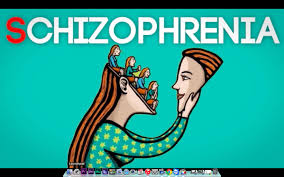Schizophrenia involves a range of problems with thinking (cognition), behavior or emotions. Signs and symptoms may vary, but usually involve delusions, hallucinations or disorganized speech, and reflect an impaired ability to function.
Symptoms may include:
- Delusions. These are false beliefs that are not based in reality. For example, you think that you’re being harmed or harassed; certain gestures or comments are directed at you; you have exceptional ability or fame; another person is in love with you; or a major catastrophe is about to occur. Delusions occur in most people with schizophrenia.
- Hallucinations. These usually involve seeing or hearing things that don’t exist. Yet for the person with schizophrenia, they have the full force and impact of a normal experience. Hallucinations can be in any of the senses, but hearing voices is the most common hallucination.
- Disorganized thinking (speech). Disorganized thinking is inferred from disorganized speech. Effective communication can be impaired, and answers to questions may be partially or completely unrelated. Rarely, speech may include putting together meaningless words that can’t be understood, sometimes known as word salad.
- Extremely disorganized or abnormal motor behavior. This may show in a number of ways, from childlike silliness to unpredictable agitation. Behavior isn’t focused on a goal, so it’s hard to do tasks. Behavior can include resistance to instructions, inappropriate or bizarre posture, a complete lack of response, or useless and excessive movement.
- Negative symptoms. This refers to reduced or lack of ability to function normally. For example, the person may neglect personal hygiene or appear to lack emotion (doesn’t make eye contact, doesn’t change facial expressions or speaks in a monotone). Also, the person may have lose interest in everyday activities, socially withdraw or lack the ability to experience pleasure.
Symptoms can vary in type and severity over time, with periods of worsening and remission of symptoms. Some symptoms may always be present.
In men, schizophrenia symptoms typically start in the early to mid-20s. In women, symptoms typically begin in the late 20s. It’s uncommon for children to be diagnosed with schizophrenia and rare for those older than age 45.
The symptoms of schizophrenia include;
Behavioural:
- Disorganized behavior
- Social isolation
- Aggression
- Compulsive behavior
- Agitation
- Lack of restraint
- Self-harm
Cognitive:
- Delusions
- Thought disorders
- Amnesia
- Memory loss
- Disorientation
- Mental confusion
Mood:
- Anxiety
- Anger
- Apathy
- Feeling detachment from self
- Loss of interest in activities
- General discontent
- Elevated mood
Psychological:
- Paranoia
- Hallucinations
- Hearing voices
- Fear
- Depression
- Religious delusions
- Persecutory delusions
The exact cause of this disorder is unknown. However, a combination of environmental factors, genetics, and altered brain structure and chemistry could play a part in the development of schizophrenia.
🔥66 Views





